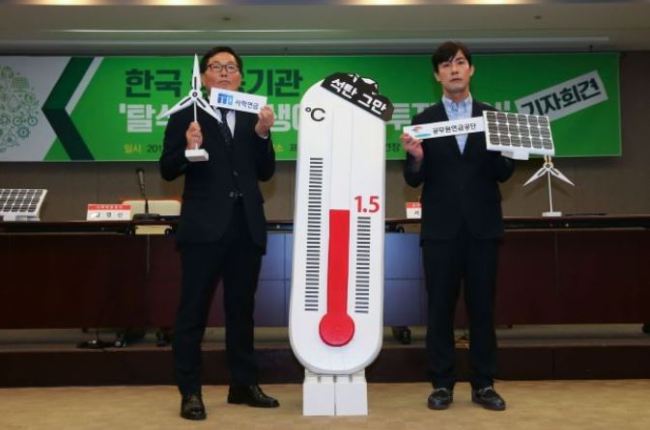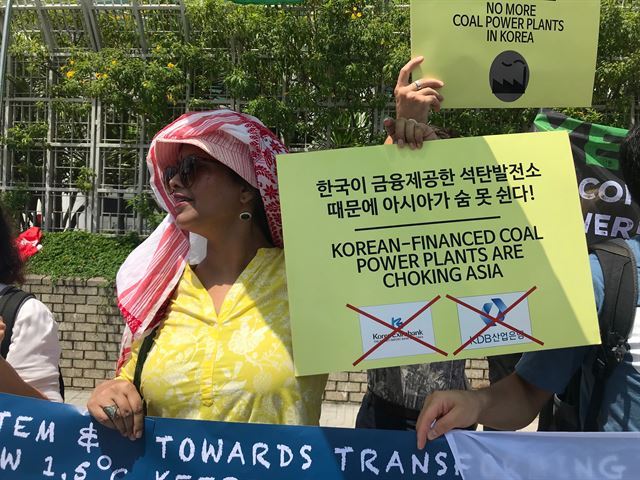Two Korean pension funds to boycott coal finance
Environmental organizations call for more participation from other financial institutions
By Shin Ji-hyePublished : Oct. 4, 2018 - 14:52
Korea’s Teachers’ Pension and Government Employees Pension System announced they will not consider financing any new coal-fired power plants, becoming the first Korean financial institutions to boycott coal financing amid the global movement to tackle climate change and air pollution problems.
Although the two hold no history of having invested in coal projects in the past, their refusal to participate in any future projects can be a catalyst for other institutions to follow suit, according to environmental activists.
In Korea, the National Pension Service, Korea Development Bank, NongHyup Financial Group and Industrial Bank of Korea are main investors for local coal projects, while the Export-Import Bank of Korea, K-sure and Korea Development Bank are linked to projects overseas.
Although the two hold no history of having invested in coal projects in the past, their refusal to participate in any future projects can be a catalyst for other institutions to follow suit, according to environmental activists.
In Korea, the National Pension Service, Korea Development Bank, NongHyup Financial Group and Industrial Bank of Korea are main investors for local coal projects, while the Export-Import Bank of Korea, K-sure and Korea Development Bank are linked to projects overseas.

Korea has faced growing calls from international society, including World Wide Fund for Nature and Greenpeace, to stop financing coal projects, which are considered a main culprit in fine dust that causes around 800,000 deaths per year.
The nation is a big investor in the global coal financing market. The total amount of investment from Korea’s public financial institutions in coal projects stood at $2 billion from 2013 to 2015, fifth greatest following China, Japan, Germany and Russia, according to a report released by US nonprofit environmental advocacy group Natural Resources Defense Council last year.
The two pension funds withdrawing from investing in coal finance have total assets of $22 billion.
“Today we will break with the dirty investment practices held by Korean financial institutions. We will put an end to investment in coal, not only because continued investment is out of synch with global trends, but because it threatens our lives by driving pollution and climate change,” a joint declaration by the two Korean pension funds read on Thursday.

“We hope our declaration today will open doors for more financial institutions to follow suit,” they said.
Lee Jong-oh, director of local civic group Korea Sustainability Investing Forum, said, “With the first announcement today, we will continue to call for other financial institutions to make second and third announcements. We will also form an alliance of anti-coal financial institutions.”
Mari Chang, a climate and energy campaigner at Greenpeace Korea, said, “The declaration of two pension funds is more remarkable while the representing public financial institutions such as the Export-Import Bank of Korea, K-sure and KDB continue their investment to new overseas coal-fired power plants toward Southern East Asia.”
The two Korean pension funds will be joining a list of 985 global finance and investment institutions that have declared they will not invest in coal as part of the global fossil-free campaign. The fossil-free campaign led by international nonprofit organization 350.org aims to reduce atmospheric carbon dioxide to 350 parts-per-million from the current level of 400 ppm.
In 2017, Deutsche Bank, the World Bank, ING Group and AXA declared they would not invest in coal projects. This year, HSBC and Citibank joined the move. Most recently, Standard Chartered published their new energy policy in August, saying they will not directly finance any new coal-fired power plant projects.
By Shin Ji-hye(shinjh@heraldcorp.com)








![[Kim Seong-kon] Democracy and the future of South Korea](http://res.heraldm.com/phpwas/restmb_idxmake.php?idx=644&simg=/content/image/2024/04/16/20240416050802_0.jpg&u=)








![[KH Explains] Hyundai's full hybrid edge to pay off amid slow transition to pure EVs](http://res.heraldm.com/phpwas/restmb_idxmake.php?idx=652&simg=/content/image/2024/04/18/20240418050645_0.jpg&u=20240418181020)

![[Today’s K-pop] Zico drops snippet of collaboration with Jennie](http://res.heraldm.com/phpwas/restmb_idxmake.php?idx=642&simg=/content/image/2024/04/18/20240418050702_0.jpg&u=)